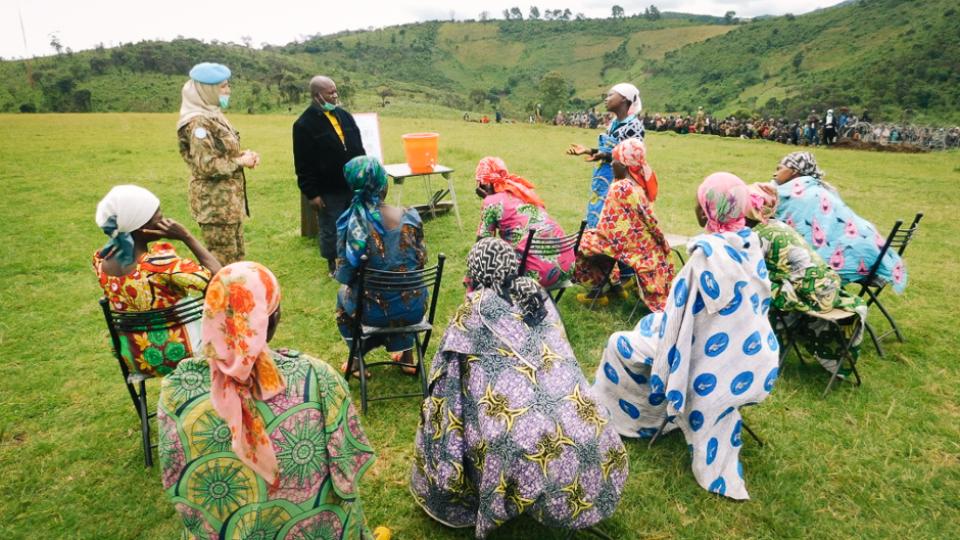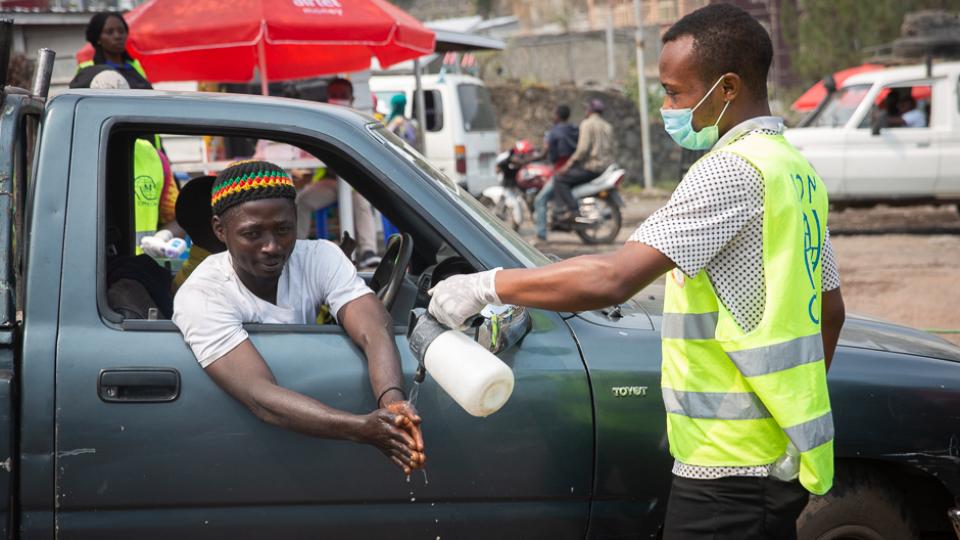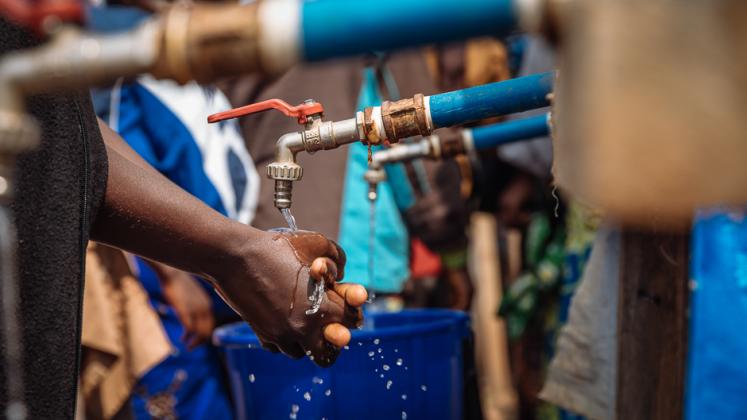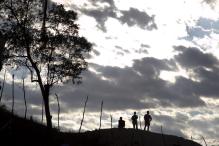This article is part of a United Nations University Migration Network series that explores the interrelations and acute challenges of migration, climate change, and COVID-19. As a build-up to International Migrants Day on 18 December 2020, the series examines these connections at local and global levels, highlights impacts on migrants, and provides evidence-based insights for United Nations member states, governments, and policymakers.
•••
Managing multiple challenges during this unprecedented COVID-19 pandemic, and planning beyond the pandemic, is proving a tough task for states, leaders, and communities globally. The spectrum of crises 'as of' or 'due to' the pandemic calls for inclusive, sensitive, and participatory planning, support, and programmes. In the Central Africa region the direct and indirect impacts of COVID-19 on people and communities, including migrants, highlight some uncomfortable facts, with media outlets and development agencies reporting bleak narratives from locals suffering from the COVID-19 situation.
The overwhelming health response required to combat outbreaks of measles, tuberculosis, and other life-threatening infectious diseases like Ebola, have rendered the region's health systems stressed. In May 2020, Doctors Without Borders reported how multiple disease outbreaks in Central Africa had led to delayed vaccination campaigns and disease prevention measures. However, the situation is particularly acute in the Democratic Republic of the Congo — a country with a significant refugee ( > 500,000) and internally displaced (5 million) population due to conflicts and other triggers related to water and climate crises and outbreaks of disease.
Compounding these circumstances, COVID-19 is having a major impact in Africa. As of December 2020 the Africa Center of Disease Control and Prevention reports about 2.3 million cases and nearly 55,000 deaths. The situation reflects a 'crisis within a crisis' showing the complex and critical interlinkages between health system deficiencies, challenges of water accessibility, and sanitation gaps, particularly for the most vulnerable and least developed states in the region.
Prior to the emergence of COVID-19, the water, sanitation, and hygiene (WASH) situation in the DRC was already dire, with only one in four people in the mainstream population having access to drinking water and sanitation systems. The situation for internally displaced people and refugee settlements is even more precarious given its limited attention and resources and its access and rights dimensions. UNHCR states “with some 630,500 Congolese refugees in the region and 4.49 million IDPs, the situation in DRC is one of the world's most complex, challenging, protracted, and forgotten crises", while highlighting a key fact — 78% Of Congolese refugees are women and children. The water needs of the people living in these vulnerable settings, particularly in the time of COVID-19, is a matter of urgent attention.
The challenges are multifaceted. For instance, according to the UN peacekeeping forces managing surveillance and protection, the pandemic directly influences security and stability measures. With changing security measures, conflicts and violence may increase, and more people will be compelled to move, thus further impacting the rate of migration and displacement. As a result, the need for multi-layered solutions, cooperation, and coordinated action has never been more urgent.

COVID-19 is reshaping migration patterns worldwide, including climate- and environment-related migration. Community involvement, a human rights approach, and smart leadership have a substantial role in COVID-19 response strategies in the short, medium, and long term. In support of this, The UN launched a major humanitarian appeal to keep COVID-19 from “circling back around the globe”. UNDESA, commenting on the social impact of COVID-19, reiterated that “people without access to running water, refugees, migrants, or displaced persons will suffer disproportionately both from the pandemic and its aftermath — whether due to limited movement, fewer employment opportunities, increased xenophobia, etc.”. During the launch of a US$2 billion COVID-19 Global Humanitarian Response Plan, Secretary-General António Guterres emphasised that basic human solidarity is crucial for combating the virus to aid those who are least able to protect themselves.
Understanding alternative water futures for vulnerable people and communities, particularly forced migrants and refugees dealing with a range of crises (including, but not limited to, COVID-19) is important. Why? because the cost of inaction will exceed the cost of action. There are no simple explanations or answers, but it is essential to understand the on-the-ground realities.
One dimension is understanding the nexus between migration, water resources, and COVID-19. WASH is a prominent component of this nexus. Such interlinkages have been deliberated at high-level events and stakeholder discussions surrounding efforts to organise collective action and consensus, but the pandemic context must be integrated appropriately through targeted interventions that address ongoing gaps and needs.
One such project is Addressing Climate- and Water-driven Migration and Conflict Interlinkages to Build Community Resilience in the Congo Basin, which we are coordinating at the UNU Institute for Water, Environment and Health with funding from Canada's International Development Research Centre. The initiative is investigating multiple interlinkages between water crises and the Sustainable Development Goals (SDGs) within the context of climate-related conflicts and migration. The project is generating new knowledge and practical solutions to improve peoples' lives (with a particular focus on vulnerable communities, women, and girls) and to enhance the understanding of water crisis-driven migration and displacement. In addition, the project is focused on strengthening capacity of stakeholders to better manage water-related crises and conflicts, including those related to WASH.
Similarly, the role of other projects and initiatives in the region remains important to take stock of the existing capacities and to design 'fit-to-purpose' solutions. For example, the Congo Basin Sustainable Landscapes programme funded by GEF-7 Programming Directions is working towards safeguarding forests, land, water, climate, and oceans, building green cities, protecting threatened biodiversity, and tackling new environmental threats.
Insights from our project and similar initiatives could help furnish current data and evidence that can contribute to a roadmap for integrated planning, awareness building, and design of 'Water-for-COVID Prevention' schemes. In such agenda settings, planners and response teams must pay particular attention to inhabitants in informal settlements, refugee camps, and temporary shelters hosting displaced people. Decision-makers should consider a joint strategy for water, pandemic, and migration response reassessment and committed investments towards action planning.

The response to COVID-19 and other future pandemics will have a significant impact on everyone whether or not their countries and communities are well-equipped to tackle the effects of the pandemic. Realigning the development agenda, economic plans, and societal norms to the new normal will require not only financial capacity, but also enhanced technical and human capacity. Years of progress in managing migration response and vulnerability are at risk due to the pandemic's widespread impact. With collapsing services and limited resources to expand humanitarian needs, the wave of civil, political, and economic unrest in DRC may intensify.
The global pandemic presents an opportunity to re-examine nature-human interlinkages with a nuanced approach. The impact of the disasters on migrants (whether related to water, food, or health crises) remains distinct from mainstream communities. The COVID-19 crisis management strategy should pay special attention to migrants and refugees and generate opportunities to engage and co-create options for their short, medium- and long-term needs.
For instance, a long-term COVID-19 response strategy could monitor WASH service delivery, progress, and effectiveness in line with specific targets of SDG 6. Short- to medium-term strategy could also include tackling drinking water and sanitation needs through better budget allocation and integration of multi-sector regulations. Addressing the weak institutional and technical capacity of actors in the water and migration response sector is also essential. Existing tools such as the DRC's national water, sanitation, and hygiene framework programme could include the needs of displaced people, migrants, and refugees. Such an approach would allow the state to pursue WASH-related interventions that commit to COVID-19 mitigation and SDG 6 implementation in tandem.
Also, boosting access to and knowledge of simple WASH practices such as handwashing could be a cost-effective short-term intervention in formal and informal settlements, refugee camps, private dwellings, and business settings like markets. Longer-term goals could focus on WASH standard operating and advocacy protocol (SOAP) and community outreach programmes. Let us remember that COVID-19 management strategies can and should be rooted in the vision of 'leaving no one behind'. A dedicated focus on migration settings in such a discourse is clearly important.
Suggested citation: Nidhi Nagabhatla. "Rethinking Water-Migration Interlinkages Within the Context of the COVID-19 Crisis," United Nations University, UNU Centre, UNU-INWEH, 2020-12-11, https://unu.edu/article/rethinking-water-migration-interlinkages-within-context-covid-19-crisis.



![smart2[1].png](https://unu.edu/sites/default/files/styles/card_view_small/public/2024-04/smart2%5B1%5D.png?itok=_-ZcLOM5)


